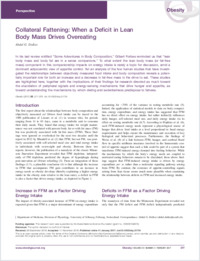Collateral fattening: when a deficit in lean body mass drives overeating
- Dulloo, Abdul G. Department of Medicine, Division of Physiology, University of Fribourg, Switzerland
-
01.02.2017
Published in:
- Obesity. - 2017, vol. 25, no. 2, p. 277–279
English
In his last review entitled “Some Adventures in Body Composition,” Gilbert Forbes reminded us that “lean body mass and body fat are in a sense companions.” To what extent the lean body mass (or fat-free mass) component in this companionship impacts on energy intake is rarely a topic for discussion, amid a dominant adipocentric view of appetite control. Yet an analysis of the few human studies that have investigated the relationships between objectively measured food intake and body composition reveals a potentially important role for both an increase and a decrease in fat-free mass in the drive to eat. These studies are highlighted here, together with the implications of their findings for research directed as much toward the elucidation of peripheral signals and energy-sensing mechanisms that drive hunger and appetite, as toward understanding the mechanisms by which dieting and sedentariness predispose to fatness.
- Faculty
- Faculté des sciences et de médecine
- Department
- Département de Médecine
- Language
-
- English
- Classification
- Biological sciences
- License
-
License undefined
- Identifiers
-
- RERO DOC 280231
- DOI 10.1002/oby.21734
- Persistent URL
- https://folia.unifr.ch/unifr/documents/305255
Statistics
Document views: 124
File downloads:
- pdf: 198
